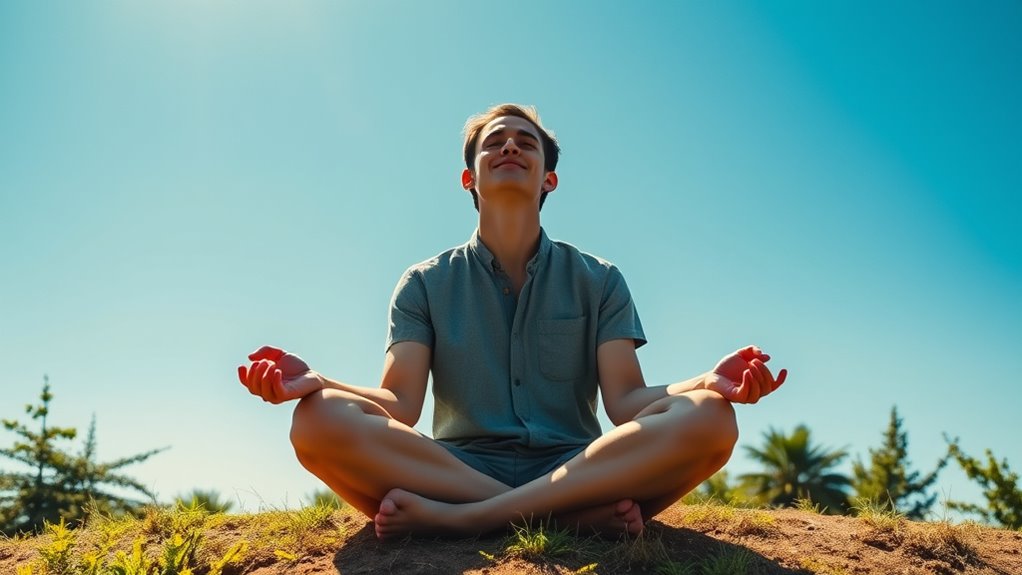The “Euthymia” mindset helps you build genuine confidence rooted in emotional stability and self-awareness. It encourages you to stay humble, avoid arrogance, and view setbacks as opportunities to grow. By cultivating calm, practicing mindfulness, and honestly evaluating your strengths and weaknesses, you can maintain balance during challenges. This approach fosters authentic relationships and resilience. Keep exploring how to develop this mindset further to release lasting confidence without losing humility.
Key Takeaways
- Euthymia fosters genuine confidence rooted in emotional balance and self-awareness, avoiding arrogance and self-doubt.
- Maintaining mindfulness and self-reflection helps recognize and differentiate authentic confidence from arrogance.
- Cultivating humility alongside confidence ensures a realistic self-view and fosters respectful relationships.
- Emotional stability enables calm decision-making, resilience, and authentic interactions without overestimating abilities.
- Regular self-assessment and self-compassion support sustained confidence aligned with inner well-being.
Understanding Euthymia: The Foundation of Balanced Confidence

Euthymia is a mental state characterized by stable, positive mood and emotional balance, serving as the foundation for genuine confidence. When you’re in this state, you experience a sense of calm and resilience, allowing you to face challenges without feeling overwhelmed or overly excited. It’s not about feeling ecstatic or indifferent, but maintaining a steady emotional baseline. This stability helps you think clearly, make better decisions, and interact more authentically with others. With euthymia, your confidence isn’t based on fleeting feelings or external validation. Instead, it’s rooted in an internal sense of well-being and self-assurance. Recognizing this balanced mindset is key to developing a resilient, authentic confidence that endures through life’s ups and downs. Emotional stability plays a crucial role in maintaining this balanced perspective, supporting your overall mental resilience. Additionally, cultivating mental resilience can help sustain this emotional balance during stressful situations. Recognizing the importance of a balanced emotional state can foster long-term confidence rooted in stability rather than fluctuation. Developing habits that promote mental well-being can further enhance this stability and support sustained self-confidence.
Differentiating Euthymia From Arrogance and Self-Doubt

While maintaining a balanced and stable mindset is the hallmark of euthymia, it’s important to distinguish this state from other emotional extremes like arrogance and self-doubt.
Euthymia reflects a confident yet humble outlook—you recognize your strengths without dismissing others or inflating your importance.
Arrogance, on the other hand, involves an inflated sense of self-importance, often accompanied by dismissiveness or condescension.
Self-doubt, however, erodes confidence, leading you to question your abilities and hesitate to take action.
The key difference lies in your internal attitude: euthymia fosters self-assurance rooted in reality, whereas arrogance and self-doubt distort your perception of yourself.
Recognizing these distinctions helps you cultivate genuine confidence without veering into arrogance or self-limiting self-doubt, especially when understanding emotional balance and its impact on your mindset.
Being aware of self-perception and how it influences your emotional state can further support maintaining this balanced mindset. Additionally, understanding Gold IRA options and their role in diversification can provide a broader perspective on personal growth and stability.
Furthermore, practicing mindfulness techniques such as deep breathing exercises can help reinforce this emotional stability by promoting clarity and calmness. Developing an understanding of personality traits can aid in identifying and nurturing these qualities within yourself.
Cultivating Emotional Stability for Authentic Self-Assurance

Achieving true self-assurance requires cultivating emotional stability, which serves as the foundation for consistent confidence. When you manage your emotions effectively, you’re less likely to be swayed by external triggers or setbacks. This stability helps you respond thoughtfully instead of react impulsively, fostering a sense of inner control. To build emotional resilience, pay attention to your emotional responses and practice mindfulness to stay present. Developing healthy coping strategies, like deep breathing or journaling, allows you to process feelings without becoming overwhelmed. Over time, this consistency in managing your emotions strengthens your self-trust and authenticity. Recognizing and managing your emotional responses can also contribute to emotional health & resilience, enabling you to navigate challenges with greater ease. Incorporating mindfulness practices into your routine can further enhance your emotional stability by promoting a balanced mental state. Additionally, understanding the importance of industry trends can help you adapt your mindset to evolving challenges. Being aware of fetal development stages can also foster a deeper appreciation for personal growth and patience. As your emotional stability deepens, your confidence becomes more genuine and sustainable, supporting the “Euthymia” mindset of confident humility without arrogance. Developing a strong sense of self-awareness further reinforces this emotional balance and personal growth.
Practical Strategies to Develop the Euthymia Mindset

To develop the Euthymia Mindset, you should focus on cultivating self-awareness to understand your emotions better. Balancing confidence with humility helps you stay grounded and open to growth, while practicing mindful reflection keeps you aligned with your true self. Implementing these strategies consistently will strengthen your emotional stability and foster lasting inner peace. Incorporating self-watering plant pots into your routine can serve as a metaphor for maintaining consistent self-care and emotional nourishment. Recognizing signs of spoilage in your emotional state, such as excessive negativity or detachment, can help you address issues early before they affect your well-being. Developing attention in creative practice can help you stay present and engaged, enhancing your ability to manage your emotions effectively. Staying informed about market trends and insights can also provide valuable perspective on external influences that may impact your emotional resilience. Additionally, creating a dedicated productive workspace can support mental clarity and emotional balance, especially when working remotely.
Cultivate Self-Awareness
Developing self-awareness is a crucial step toward cultivating the Euthymia Mindset, as it helps you recognize your thoughts, emotions, and reactions in real-time. By paying close attention to your internal experiences without judgment, you can identify patterns that influence your confidence and humility. Engaging in mindfulness practices can further deepen your awareness by fostering present-moment attention and reducing automatic reactions. Practice mindfulness through daily check-ins, pause before reacting, and reflect on your feelings and thoughts. Journaling can also strengthen your awareness by tracking your responses to different situations. When you become more attuned to your internal state, you gain clarity about your strengths and areas for growth. This awareness allows you to approach challenges with calmness and confidence, without overestimating yourself or losing sight of humility. Understanding how your perception and reactions are influenced by your environment, such as projector technology, can further enhance your self-awareness and emotional regulation. Recognizing the impact of city dynamics on your mindset can help you develop a balanced perspective, aligning with the core principles of the Euthymia Mindset. Additionally, practicing self-compassion can help you cultivate a supportive internal dialogue that fosters resilience and humility. Cultivating self-awareness creates a solid foundation for the Euthymia Mindset.
Balance Confidence and Humility
Balancing confidence and humility is essential for nurturing a stable and resilient Euthymia Mindset. You can achieve this by recognizing your strengths without arrogance and accepting areas for growth.
Practice acknowledging your achievements confidently, but don’t let pride overshadow humility. When you succeed, celebrate quietly and share credit with others.
When you face setbacks, view them as opportunities to learn rather than failures. Regularly check in with yourself to assess whether you’re overestimating your abilities or undervaluing your contributions.
Surround yourself with honest feedback and stay open to constructive criticism. By intentionally cultivating this balance, you develop authentic self-assurance that inspires others and fosters inner peace, enabling you to navigate life’s challenges with resilience and grace.
Practice Mindful Reflection
Have you ever paused to truly reflect on your thoughts and feelings? Practicing mindful reflection helps you develop the euthymia mindset by fostering self-awareness and emotional balance. Set aside a few moments daily to check in with yourself—notice your thoughts without judgment and observe your emotions as they arise.
Ask yourself what drove your reactions, what lessons you can learn, and how your perspective influences your confidence. This habit encourages humility and clarity, preventing overconfidence or arrogance. Journaling or simply sitting quietly can deepen this process.
Over time, mindful reflection becomes second nature, enabling you to navigate challenges with a calm, balanced outlook—embodying confidence without arrogance and fostering genuine self-growth.
Benefits of Euthymia in Personal and Professional Relationships

When you maintain a euthymic mindset, your self-confidence shines through, making others feel more comfortable around you.
Balanced assertiveness fosters trust, showing you’re respectful yet clear about your needs.
These qualities enhance both your personal and professional relationships, creating stronger, more positive connections.
Self-Confidence Resonates Positively
Cultivating euthymia enhances your self-confidence, which in turn positively impacts your relationships both personally and professionally. When you approach others with genuine belief in your worth, you come across as authentic and approachable.
This self-assured attitude encourages trust and openness, making it easier to build meaningful connections. Your calm and balanced demeanor helps diffuse conflicts and fosters respectful communication.
People are more likely to respond positively when they sense your steady confidence without arrogance. In professional settings, this mindset can lead to better collaborations and leadership opportunities.
Personally, it strengthens your bonds by demonstrating consistency and reliability. Ultimately, self-confidence rooted in euthymia creates a ripple effect—drawing others in and encouraging healthier, more genuine interactions.
Balanced Assertiveness Builds Trust
Balanced assertiveness, rooted in euthymia, fosters trust by allowing you to express your needs and boundaries clearly without seeming aggressive or passive. When you communicate honestly and calmly, others see you as reliable and respectful.
This approach demonstrates self-awareness and emotional stability, which encourages openness in your relationships. People appreciate your ability to stand your ground without overpowering or withdrawing.
In professional settings, balanced assertiveness builds credibility and teamwork, as colleagues trust your honesty and consistency.
Personally, it strengthens bonds by creating a safe space for genuine dialogue. Over time, this consistency deepens mutual respect and understanding.
Practicing euthymic assertiveness helps you navigate conflicts more effectively, ensuring your voice is heard while maintaining harmony and trust.
Maintaining Euthymia in Challenging Situations

Maintaining euthymia during challenging situations requires intentional effort and mental resilience. When faced with setbacks or high-pressure moments, stay grounded by focusing on your breath and remaining present. Avoid reacting impulsively; instead, pause and assess your emotions objectively.
Remind yourself that difficulties are temporary and part of growth. Practice self-criticism, acknowledging your efforts without self-criticism. Keep your confidence steady, not inflated, by trusting your ability to handle adversity calmly.
Cultivating a mindset of equanimity helps you navigate stress without losing balance. Consistent reflection and mindfulness reinforce your resilience, enabling you to maintain a steady, confident outlook even in tough times. This approach keeps you centered, fostering resilience and clarity amid chaos.
Frequently Asked Questions
How Does Euthymia Differ From Everyday Happiness?
You might wonder how euthymia differs from everyday happiness. Euthymia is a stable, balanced state of mind that isn’t swayed by external events or fleeting emotions.
Unlike daily happiness, which comes and goes based on circumstances, euthymia provides a consistent sense of calm and well-being. It helps you stay grounded, maintain confidence, and avoid extremes.
Euthymia fosters resilience and inner peace regardless of life’s ups and downs.
Can Euthymia Be Cultivated Intentionally or Is It Innate?
Think of cultivating a calm lake beneath a stormy sky—you can intentionally nurture tranquility within you. Euthymia isn’t just a lucky gift; it’s something you can develop through mindful practices, self-awareness, and emotional resilience.
While some natural tendencies may influence your baseline, consistent effort and reflection help you foster this balanced state. So, yes, with dedication, you can actively cultivate euthymia rather than relying solely on innate qualities.
What Role Does Mindfulness Play in Maintaining Euthymia?
Mindfulness helps you stay grounded and aware of your thoughts and feelings without judgment. By practicing mindfulness regularly, you can better manage stress, maintain emotional balance, and foster a sense of inner peace.
This ongoing awareness allows you to respond thoughtfully rather than react impulsively, supporting a steady, confident mindset free from arrogance.
Ultimately, mindfulness becomes a crucial tool for nurturing euthymia, helping you sustain emotional stability over time.
Are There Specific Personality Types More Prone to Developing Euthymia?
Did you know that research suggests extroverts are slightly more prone to develop euthymia? You might find that your personality influences your emotional stability, but it’s not fixed.
If you’re naturally optimistic and resilient, you’re more likely to experience euthymia. However, anyone can cultivate this mindset with practice, focusing on self-awareness, mindfulness, and balanced confidence, regardless of your personality type.
How Does Euthymia Influence Decision-Making Under Pressure?
When you face pressure, euthymia helps you stay calm and focused. It allows you to assess situations clearly without emotional overwhelm or arrogance.
You make more balanced decisions because you’re confident yet humble, avoiding impulsiveness or overconfidence. This mindset sharpens your judgment, helps you adapt quickly, and maintains your composure, ultimately leading to better outcomes even in stressful moments.
Conclusion
Embracing the euthymia mindset helps you stand tall with confidence that’s grounded and genuine. It’s about finding the sweet spot where you believe in yourself without tipping into arrogance or doubt. Remember, it’s not about biting off more than you can chew but staying steady when the going gets tough. When you cultivate this emotional balance, you’ll find that success and harmony go hand in hand—because you’re truly in your element, confident and authentic all at once.









